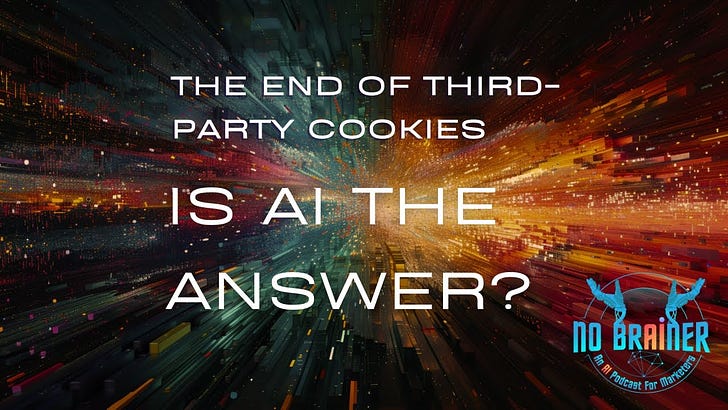Future of Marketing: How Will the CMO Role Evolve?
If customer journey analytics are the North Star in the AI era, how will the data-centric CMO role evolve?
This continues the Future of Marketing series. The last article in the series focused on the evolution of customer journey analytics. A second related article discussed how ML is driving the evolution of customer journey analytics.
Many of today’s CMOs are hired based on their ability to provide strong measurable results and decipher customer journey trends based on analytics information. Enter the AI era, where machine learning-fueled analytics are starting to outpace human abilities to parse data into niche information and find hidden insights. With more substantial and robust analytics deciphering the customer journey, how will the CMO role evolve in the AI era?
Analytics-based decision-making is fueled by historical data and assuming that the past will fuel the future. If every marketing decision is based on probability from past data, then most decision-making CMOs offer will only be as good as their data and most robust AI solutions.
This trend depends on customer journey analytics advancing so that it produces quality insights and answers queries on demand. Once AI provides customer journey clarity, it will only be a matter of time before human analysts' roles change, serving as the checks against AI answers.
An experienced senior data analyst can execute that task, but basic analysts or senior executives may no longer have value in this capacity. A CMO’s role as the ultimate arbiter of the customer journey will evolve as allocating and sourcing operational resources – data, data science, AI technologies, etc. — takes precedence over gleaning new insights.
A recent study, “Artificial intelligence (AI) applications for marketing: A literature-based study,” published by several authors in the International Journal of Intelligent Networks, noted, “AI is a strong tool when combined with high-[GV2] quality market research data. This enables companies to complete a wide range of tasks. The segmentation of target groups is an important feature of this widely used use case. AI is substantially faster and more efficient than humans in this work.”
It's easy to see where some may be intimidated by the increased role of AI in determining AI impacts. Rather than waging a war to compete against AI, marketing leaders can focus on other skills that will increase in importance to strengthen competitive positioning, including strategic savvy operations strength, EQ, and creativity.
For some, this may be a relief, as the demands of other C-suite members have forced CMOs to move away from traditional marketing execution and into analytics. As the AI revolution continues impacting the customer journey, creative frameworks and strategies will have a renaissance. Seizing opportunities revealed by analytics with productive, impactful marketing will differentiate one company from another.
“Almost everything about marketing will need to be reimagined over the next few years, including how AI and other technologies are used and explored,” said Shelley E. Kohan. “While the CMO job may not become extinct, the role we know today will vastly differ.”
How CMOs Will Need to Manage Technology Operations and Foster Creativity
Analytics engines will better understand how marketing actions will impact brand sales than the human strategist. Once the technology fulfills its promise, instead of identifying trends, the CMO’s office must ensure substantial data collection and governance, procure the right marketing AI technologies, and foster more robust creative and marketing innovation.
Those CMOs who build and manage systems of people who can work with AI-infused tech stacks and tools to produce original stand-out marketing will rise to the top. In the traditional sense, excellent business management skills will win out. The CMO of tomorrow is a tech-savvy operations and talent management leader.
Enterprises will see the CMO office orchestrate and manage the right customer data governance policies, gather clean, robust data, procure the correct martech tools, and harness and support creative talent to guide campaign development. This includes predictive analytics and generative AI to forge stronger marketing strategies and customer journey campaign elements.
At the heart of this change are complex marketing AI models that blend a series of algorithms, from ML and predictive analytics to generative AI tools and AI agents. Data and tool governance become paramount in this model. As the adage goes, garbage in, garbage out. The CMO Office must ensure vital data and AI tools to effectively manage and improve the customer journey.
Today’s technologies are immature, and vendor hype – while high – fails to productize marketing strategy and analytics. To achieve this functionality, enterprises need to deploy strong data science teams to build, test, and implement these models.
Often, professional services firms with solid offshore presences work with large enterprises to build these systems. While many medium enterprises cannot afford such systems, many traditional CRM and customer data platform (CDP) players, as well as a host of new startups, are building solutions to serve companies. The next few years hold promise for forward-thinking marketers regardless of the size of their company.
Evolving Traditional Marketing Roles
In most marketing scenarios, AI-based systems will handle traditional roles like pricing, strategy and planning, product, promotion, and distribution management. AI will impact other key marketing tasks like targeting, positioning, segmentation, product design, and more. Members of the CMO office will guide and govern or work hand in hand with AI systems that execute these tasks.
Creativity will become an even more valuable skill for senior marketers. The ability to deliver original, creative innovative product or service design, fresh marketing strategies and ideas, and unique campaigns and promotional concepts will separate the best from the average. While AI can highlight unseen patterns, offer new iterations of content, and suggest probable paths of success, the genuinely new is the domain of the creative human mind.
That doesn't mean graphic designers and other creatives will suddenly take over the world. Nor does it mean creatives, product marketers, and strategists will not use AI. On the contrary, the most successful innovators will use AI to strengthen their offerings, validate them, and deliver them faster than their “human-only” counterparts. The CMO needs to facilitate the integration of AI-enhanced creativity.
Tech fluency and the ability to fully evaluate, select, and integrate new marketing technologies will also become increasingly important. Rather than relying on the CIO’s office to procure technologies, the CMO’s office will play a more significant role in identifying and procuring the tech stack.
Marketers will look to build systems and procure tools that improve the customer journey and experience while maximizing internal efficiency and effectiveness. This is a marked change from the current focus on procuring app-centric AI functionality. Initial procurement sparked by generative AI has focused on point solutions that promise to deliver better personalization, content creation, or segmentation. Effective marketing AI procurement will focus on integrated systems instead of individual apps.
Conclusion: The Customer North Star
Ultimately, customer experience should be the north star driving every CMO's decision and action. As such, the entire marketing organization will focus on strengthening the customer experience and marketing effectiveness.
The CMO’s office will be responsible for strengthening marketing efficiency and improving the customer experience. As such, it will be necessary to operationalize the customer experience by procuring AI systems, marketing technology, talent management, hiring, and campaign development. The ability to see which actions impact customers, see sudden changes in customer behavior actions, and predict which incentives and actions will close deals is already invaluable for early adopters of such analytics systems.
This assumes marketing AI models, technology, and data governance improvements will break barriers to mapping out and understanding the full breadth of the customer experience and the levers that trigger customer actions. Once mapping is complete, a baseline can be established, empowering the CMO’s office to manage the experience.
Here, intelligent and informed creativity can make a significant impact. With analytics, leadership, and their creatives can quickly optimize their campaigns to meet customer needs. Marketing efficacy will be measured by the brand’s customer success goals and KPIs. This is as true of AI systems, from predictive analytics through campaign personalization, as it is of the humans guiding it.
All images were created with Midjourney.
Related Articles
Customer Journeys: ML to the Rescue
The most recent No Brainer Podcast centered on the move away from third-party data cookies and how AI may resolve it. Data protection laws like General Data Protection Regulation (GDPR) and the California Consumer Privacy Act (CCPA) have forced browser companies to shed third-party cookies, forcing digital marketers into a new territory. As the year progresses, marketers dependent on electronic commerce must collect first-party customer data and better interact with them to convert.
Future of Marketing: Goodbye Vanity, Hello Clarity in Marketing Attribution
This is the second in a series of articles dedicated to AI’s impacts on the future marketing organization. The first article examined AI’s potential impacts on agencies. Many sales and marketing executives complain about the lack of clarity about which marketing actions drive customer interest and conversion. Most attribution modeling uses first or last-…
Future of Marketing Series: How AI Will Create Massive Disruptions in the Agency Sector
Last November, I wrote an article detailing five ways AI will create sea changes in the marketing sector. This is the first of a series of articles expanding on those themes. AI is ideal for automating repeatable tasks, including those actions outsourced to marketing agencies. Many billable by-hour rote tasks performed by junior staffers will be replace…












